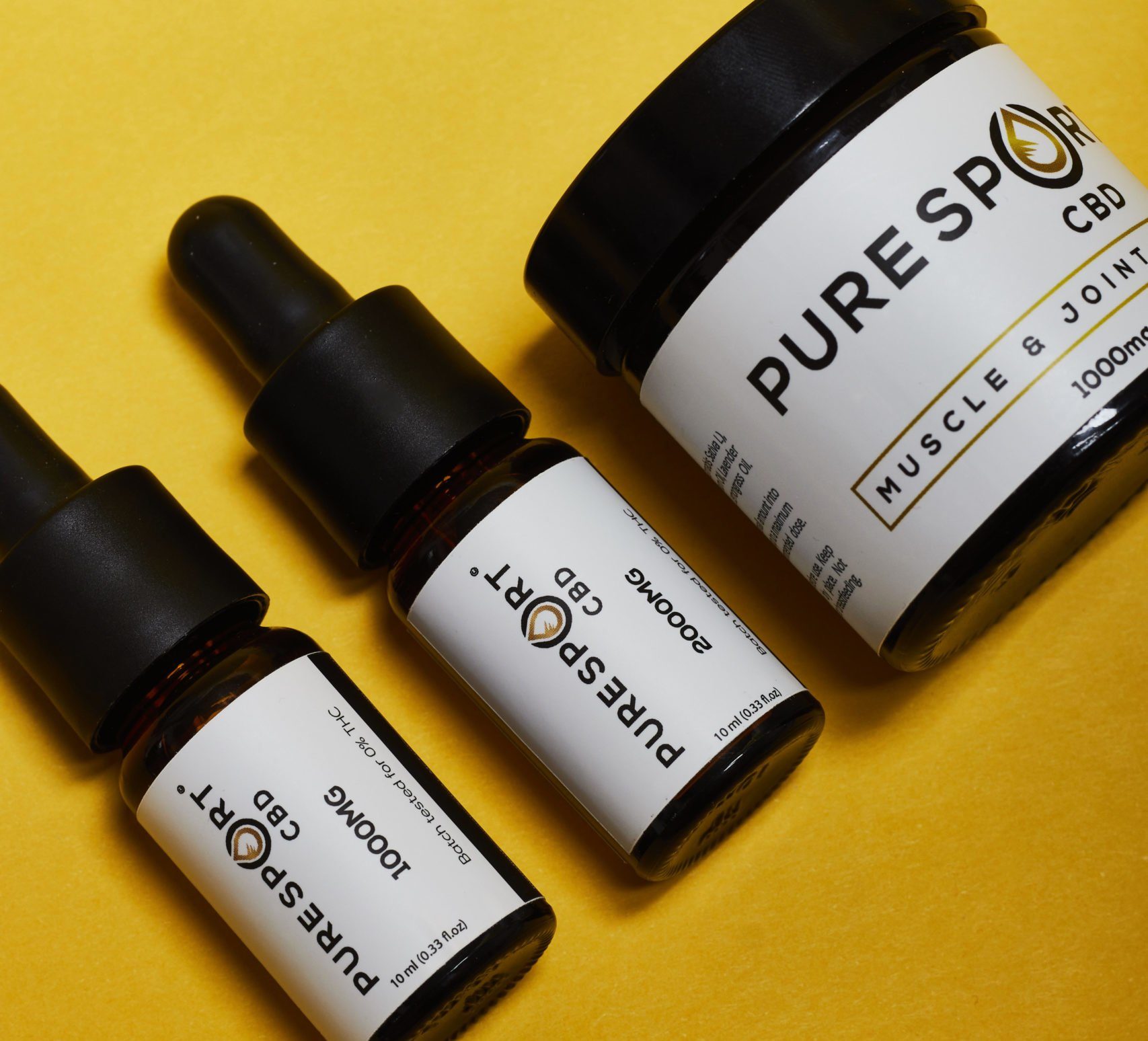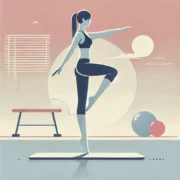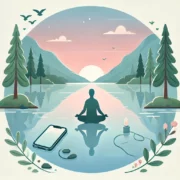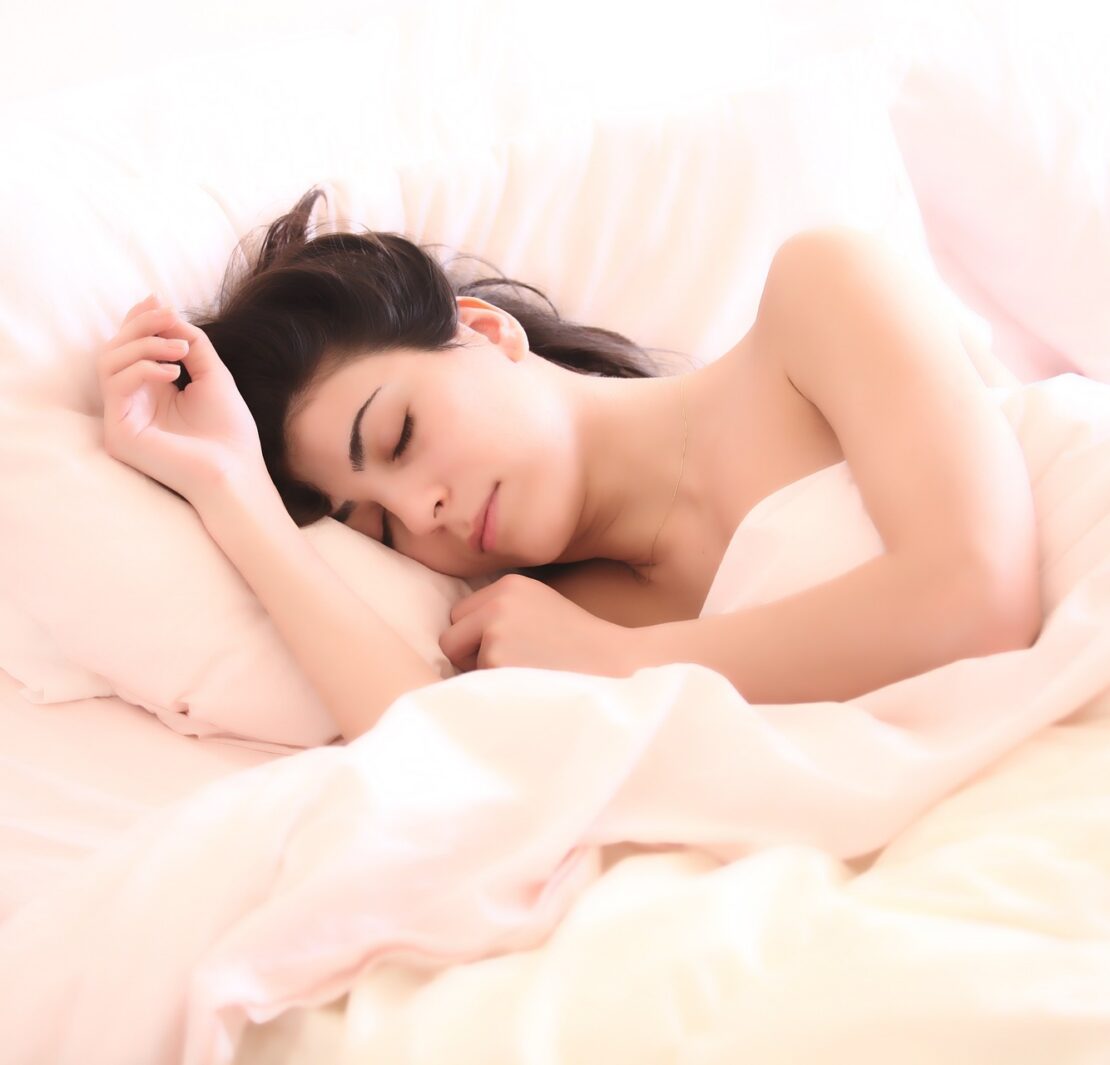Many of us have trouble falling asleep and staying asleep. It’s always annoying to toss and turn all night long because it feels like having zero energy reserves the next day.
To ensure a restful night’s sleep without interruptions, people from all over the world have created their own sleeping rituals and hacks, supported by some evidence. Please continue reading to find out.
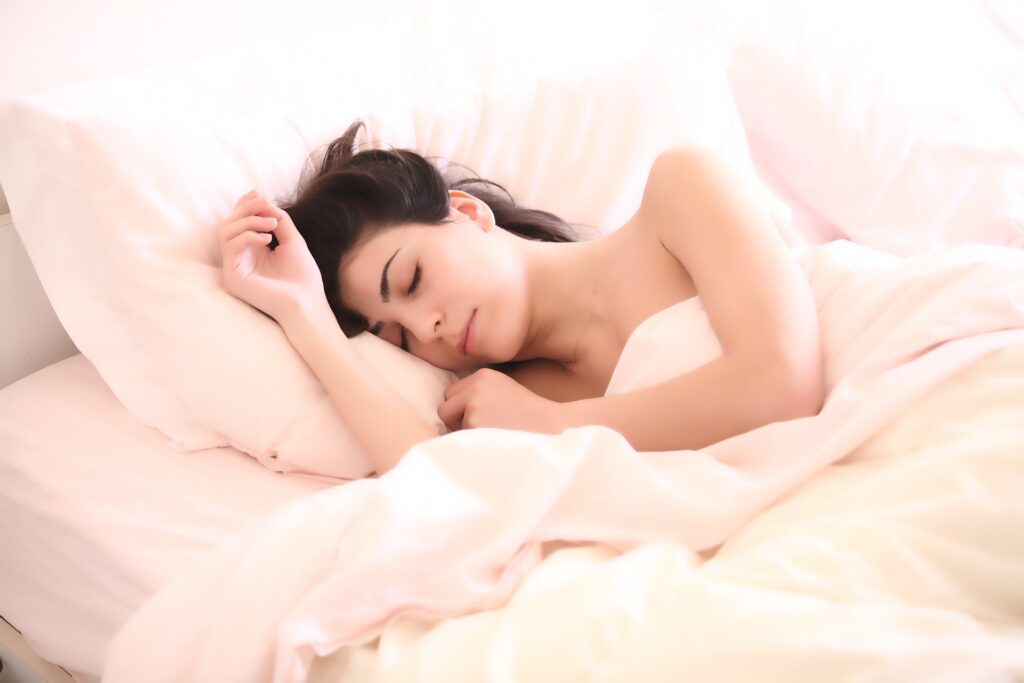
Sleep Hacks Covered
Are you restless in the middle of the night, twisting and tossing in bed? Are you watching the hands of the clock slowly move closer and closer to the time when the alarm is set to go off?
Does it feel like you’ll never be able to get the sleep you need? You are not the only one experiencing this.
This is a reality for many people who suffer from the anguish of insomnia and sleeplessness and spend each night fighting against their inability to fall or stay asleep.
Sleep is a natural process in creatures. While you sleep, your mind and body work tirelessly to restore your energy.
Not getting enough sleep can have serious consequences for your emotional and physical well-being.
Half of respondents in a study conducted by the Mental Health Foundation reported that poor sleep contributed to greater levels of anxiety and sadness.
Sleep deprivation is associated with an increased risk of establishing cardiovascular disease and diabetes, which can accelerate ageing, and have a substantial effect in the fatalities that occur because of car accidents.
The very next time you have trouble falling asleep; it won’t help to consider a few minor details. There are, however, simple adjustments in your daily routine that can unquestionably lead to improved sleeping patterns.
Common Causes behind Sleep Problems
Everyone must get enough sleep-in order to live properly, but they do not find it easy to do so.
Sometimes, even if you want to sleep, your mind won’t let you do so because of the thoughts about that day or the plans about the next day.
There is a root cause behind every issue and mentioned causes might help you find out about yours.
Several factors can lead to poor sleep quality. They include medical, psychological, and environmental conditions.
Stress Levels
Have you ever realized that stress and depression levels not only affect your health but also prevent you from getting a sound sleep?
Deep sleep, during which the body repairs and replenishes itself, may be impossible if you’re under a lot of mental or emotional strain.
Anxiety might also cause you to have restless nights when you wake up over and over again. Under stress, you may sleep less frequently, and your sleep quality may be compromised.
There are numerous ways, in which stress can disrupt a person’s sleep quality. Getting the required seven to nine hours of sleep can be challenging when your mind is still active after performing the daily activities.
Noise
Noise in the environment is often considered to be a major contributor to sleeplessness. Disrupted and fragmented sleep caused by night-time noises is less restorative as compared to the normal sleep.
Noises that don’t keep us awake can nonetheless alter our sleep patterns without our conscious awareness.
The brain keeps picking up and processing noises even when you’re sleeping. The quality of sleep and the rate, at which, a person progresses from the stages of sleep can be negatively affected by external noises.
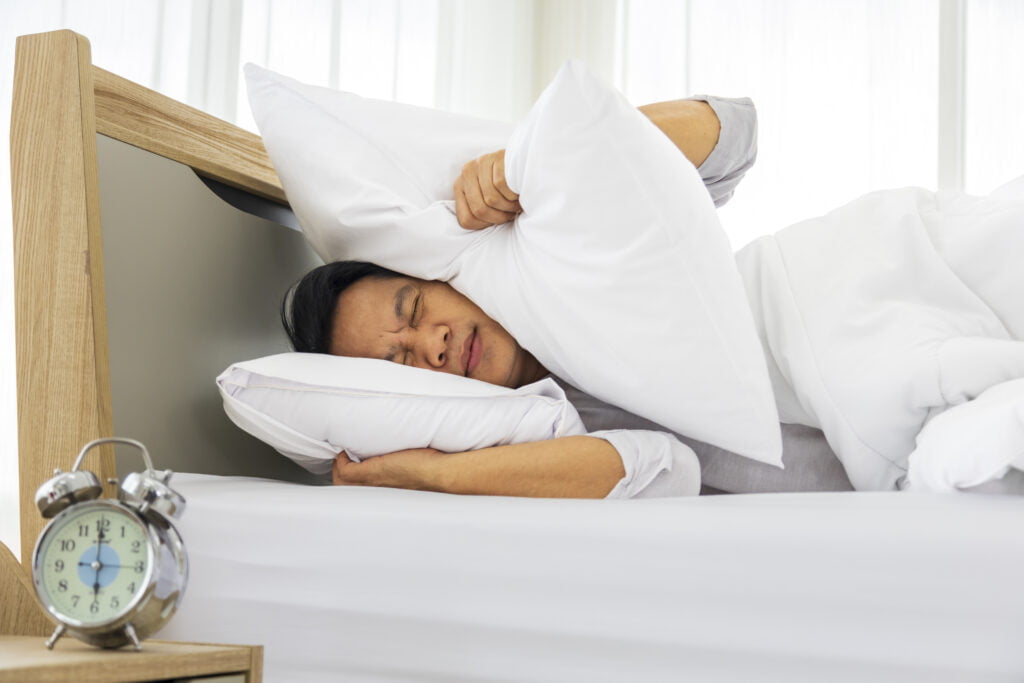
Research suggests that exposure to environmental noise at night is associated with an increased risk of cardiovascular disease, and even relatively quiet environments can have negative health effects on some people because their sleep is disrupted.
Drug Intake
Having difficulties getting a good sleep? Your drug use may be the problem. Sleep issues have been linked to pharmaceutical drug use, misuse, and withdrawal.
Acute drug exposure affects sleep by altering sleep time, frequency, and quality. With continuous administration, sleep disturbances become more severe, and during withdrawal, insomnia predominates with negative effects, which drive drug cravings and contribute to a relapse.
Consumption of Alcohol
To unwind or get to sleep, some people drink alcohol at night. Consistent alcohol use has been linked to diminished sleep quality and an overall lethargic disposition the next day.
Alcohol interferes with a person’s body’s natural rhythms, making it difficult to sleep and stay asleep.
Drinking alcohol can also make you dehydrated because it acts as a diuretic, causing your body to sweat more than usual.
If you have a few more drinks than usual, you may find yourself getting up in the middle of the night to use the restroom. And you’ll lose more water than you drank.
Caffeine Intake
Caffeine is known to have a negative impact on sleep quality. A common side effect of this stimulant is sleeping difficulty.
Caffeine, according to research, can also make your biological clock run late. As a result of these factors, you will sleep less overall.
In addition to disrupting your sleep cycle, caffeine can lessen your ability to enter a deep sleep phase.
Even if you drink coffee later in the afternoon or evening, you can still feel the effects of caffeine at night.
According to the findings of a study, drinking coffee six hours before going to bed may reduce an hour of sleep.
These effects can also become more obvious with age because the bodies of old people require more time to absorb coffee than average.
Nightly Routines
Have you ever observed that despite being tired, you are unable to sleep? This may happen because your night routines may be inappropriate.
The activities you engage in the late hours can have a considerable impact on the quality of sleep you get.
It’s possible that you lack a proper sleep hygiene, which may be preventing you from getting a restful night’s sleep. An example of this is eating too close to bedtime.
Additionally, lying down while your stomach is still digesting meals might create acid reflux, which in turn slows down your metabolism; therefore, eating late at night can cause stomach troubles, which can prevent a person from getting a good night’s rest.
Also, the usage of technology affects the quality of sleep by disturbing the circadian rhythm, cutting down on deep sleep, wanting to keep the brain active at night, and changing sleep patterns.
Most sleep problems exhibit one or more of the following four symptoms, which appear because of the causes mentioned above:
- You have difficulty getting asleep or staying asleep
- You have trouble staying awake during the day.
- You experience circadian rhythm irregularities that interfere with a healthy sleep pattern.
- You choose strange sleep-disrupting behaviours.
Best Sleep Hacks that Really Work!
What if there were a routine that ensured you woke up refreshed after sleeping all night, and wake up in the morning smiling like a baby? You may find that you no longer need so many extra minutes in bed after getting a good night’s sleep, so try some of these “sleep hacks” to relax your mind and body before bed.
Some minor additions to your daily routine and bedroom setting would get you the best sleep of your life.
Have a banana before you go to sleep.
One of the nutritious sleep hacks is eating a healthy snack, such as a banana, an hour or a half-hour before bedtime.
Bananas are a fantastic source of both potassium and magnesium, which are natural muscle relaxants.
Also, they have the L-tryptophan, an amino acid which the brain turns into 5-HTP. The 5-HTP is then changed into serotonin, which is a neurotransmitter that makes you feel calmer. For further information, please see this article.
Additionally, serotonin regulates melatonin, the hormone that controls your circadian rhythm (sleep-wake cycle).
Cherry before sleep
Another amazing deep sleep hack is consumption of cherry before sleep. Agricultural research studies indicate that cherries are one of the few natural food sources of melatonin.
Melatonin is the chemical that governs the body’s internal clock to coordinate sleep. Researchers that have confirmed that the amount of melatonin is sufficient in cherries and advised consuming them approximately one hour before going to bed.
Warm Milk
Warm milk before night may aid sleep since it contains nutrients that help you relax.
There is some evidence that drinking warm milk prior to the bedtime can aid with sleep. The effectiveness of this sleep hack is evident by a study, in which participants, who drank lukewarm milk with honey for three days while staying in a hospital’s heart unit, reported a better sleep quality.
Military sleep hack
Did you ever wish you could force yourself to sleep whenever and wherever you wanted? Then you surely have heard military sleep hack to fall asleep faster.
This method, said to have originated in the US Army, can help you achieve that, allowing you to fall asleep within as little as two minutes after closing your eyes.
- First, relax your entire body from head to toe. Relax your forehead muscles. Relax your eyes, cheeks, jaws, and breathing. Now, your neck and shoulders.
- Relax your shoulders. Keep your arms, hands, and fingers loose on your sides. Imagine a warm fuzzy feeling from your head to fingers.
- Imagine the warm feeling from your heart to your toes. While doing this, it’s vital to empty your mind of any concerns by picturing yourself in a kayak surrounded by beautiful lake water or in a black velvet bed in a pitch-dark room.
- If you get distracted, say the words ‘don’t think’ to yourself. If you do this every bedtime for 6 weeks, you will fall asleep within two minutes.
Chamomile; the insomnia hack
Chamomile is far superior to any other sleep aids in the market. This classic will never be surpassed.
It has been around for decades and is without a doubt one of the most well-known herbs for aiding in sleep that is currently available in the market.
Before going to bed, you might want to try drinking some chamomile tea.
This insomnia hack would land you in dreams. Because of its unique chemical composition, which includes the presence of apigenin, which activates GABA receptors, chamomile is one of the most efficient herbs for inducing sleep.
Biohacking of blue light exposure
Turning away from electronic screens two to three hours before bedtime and reading a book is one of the simplest things you can do to protect your sleep from the negative effects of blue light.
Despite being simple, this sleep hack called biohacking blue light exposure would help you fall asleep faster.
According to a number of studies, wearing lenses with an amber tint (also known as blue light spectacles) that filter out blue light may also help improve the quality of a person’s sleep.
Relaxing Music and Wind Down
The right kind of music has a real power. Relaxing music can evoke strong feelings, transport us back in time, and even trigger olfactory memories. Now picture that music as a dream-inducing factor.
To get to deep sleep and stay asleep, listening to soothing music before bed may help alleviate stress and anxiety.
And, if you make it a habit to listen to soothing music before bed, your body will learn to associate it with sleep, allowing you to drift off to a deep sleep more quickly.
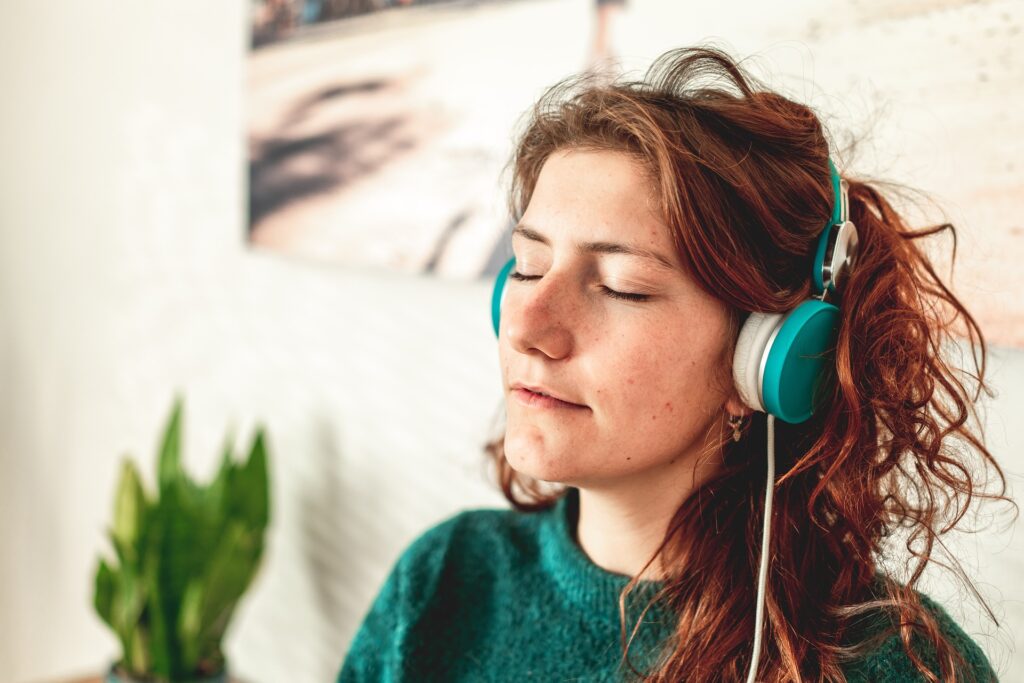
Aromatherapy & Essential Oils
The olfactory nerve provides impulses to the brain that activates our sense of smell. The aromatherapy benefits of lavender oil include a reduction in blood pressure, pulse rate, and even skin temperature, all of which contribute to a more relaxed state of mind.
It also induces a sensation of calm by altering brain waves. Jasmine, clary sage, lemon, and bergamot are among more fragrant oils used in aromatherapy.
The Wall Street Journal also cited a 2008 research that termed lavender effective for helping women with insomnia get to sleep.
Try yogic sleep hacks
Yoga induces deeper sleep, and removes sleep problems such as anxiety, insomnia, and sleep apnoea.
The best part is that you can practice yoga in the evening without spending a lot of your time. It doesn’t have to be a lengthy and complicated process.
Breathwork
- Hold your breath for four counts.
- Exhale for four counts, and then hold for another four counts after the exhale.
Shoulder Position
- Doing the yogic shoulder pose to get the blood away from your feet.
- You should lay down on your back, bring your knees up to your chest, and then extend your knees up towards the sky.
- Put your hands under your hips to help you.
Pose of a Child
The child’s pose positively affects the brain’s parasympathetic nervous mechanism and calms the body, mind, and heart.
- Kneel on the ground with your knees spread apart but keep your toes together.
- Put your upper body on the floor and stretch your arms out in front of you.
- Hold for at least five to ten breaths.
- Try out different ways to do this pose to find out the most comfortable way to do it. You can have wide or narrow knees, and your arms can go forward or placed around your legs. You can put a pillow or bolster under your chest, forehead, and/or hips to give you more support.
The 4-7-8 Breathing Method
Using 4-7-8 technique, you breathe in just for four counts, hold your breath for seven counts, and breathe out for eight counts.
The 4-7-8 technique, which is also called the “relaxing breath,” has its origins in pranayama, is a yogic exercise of controlling the breath.
Throughout the practice, keep the point of your tongue against the crest of tissue underneath your upper front teeth as you exhale through your mouth and across your tongue. You should then do these things:
- Make a whooshing sound as you let all of your breath out of your mouth.
- Slowly breathe four times with closed mouth.
- Keep your breath until you mentally count seven.
- Make a whooshing sound with your mouth as you let out your breath on the eighth count.
- Do these three more times for a complete four breath phase.
Take a warm shower or bath
A decrease in body temperature contributes to an increased likelihood of feeling sleepy. If you take a hot bath before bed, the temperature of your body will rise, and the sudden drop in temperature that occurs after you get out of the bath can make you feel more relaxed and more likely to fall asleep.
Supplement your sleep
You shouldn’t rely on sleeping pills as a long-term solution; but there are several energy products and biohacking supplements that you may add to your diet that might be able to assist you in falling or staying asleep.
Melatonin and valerian root are two of the many supplements that may be found in most grocery and health food stores.
For long-term sleep health, it is the best to combine natural sleep hacks & nutrients with good sleep hygiene.
Final Thoughts
Overall, sleep is a peaceful state of mind. Some nights, it’s hard to fall asleep quickly and tossing and pondering about not being able to sleep only tends to make it worse.
There are several factors that you should consider transforming your unhealthy sleeping routine. Eliminating the core of sleep problems and applying a few sleep hacks would help you fall asleep faster and for a longer duration.
